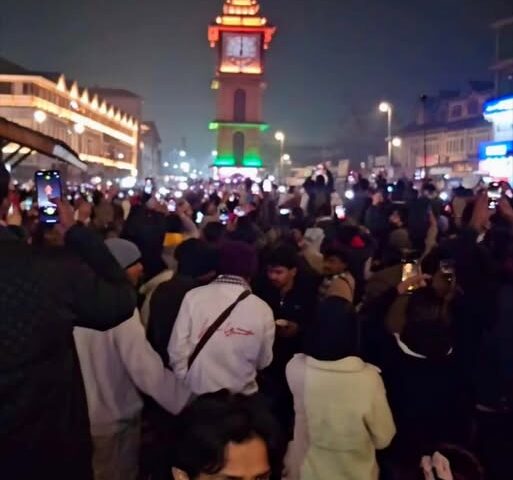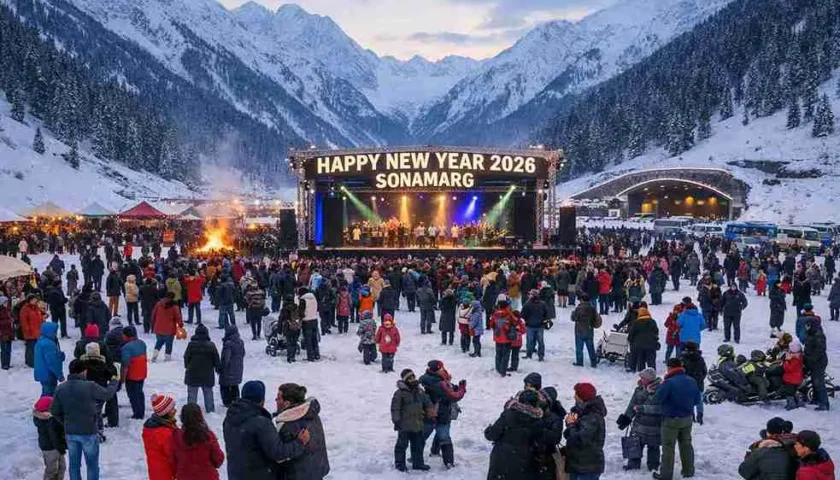Srinagar–Jammu Highway Disruptions and the Apple Cargo Train: A Lifeline for Kashmir’s Economy
By: Javid Amin | 14 September 2025
The Highway That Holds Kashmir Together
The Srinagar–Jammu National Highway (NH-44) is more than a stretch of asphalt and tar—it is Kashmir’s lifeline. It snakes through treacherous mountains, unstable slopes, and weather-beaten passes, connecting the Valley to the rest of India. Every sack of rice, every cylinder of cooking gas, every tourist vehicle, and every truckload of apples depends on this single artery.
Unlike most other states, Jammu and Kashmir does not enjoy multiple entry and exit points for trade. The railway still terminates at Banihal, and air cargo is too costly for bulk goods. For all practical purposes, NH-44 is the jugular vein of Kashmir’s economy.
-
Daily movement: Thousands of vehicles ply every day—passenger buses, supply trucks, oil tankers, and fruit carriers.
-
Economic dependence: Over 90% of Kashmir’s goods enter or exit through this road.
-
Tourism dependence: Lakhs of tourists arriving in Jammu by rail rely on the highway to reach Srinagar, Gulmarg, and Pahalgam.
The dependence is total, and therefore, every time the highway collapses—whether by landslide, snowfall, or flooding—Kashmir collapses with it.
The September Crisis: Landslides and Chaos
September 2025 brought yet another reminder of this fragility.
At Tharad in Udhampur, a 250-meter stretch of road sank, forming cracks so deep that entire truck tires could disappear into them. The sinking ground forced authorities to partially shut down NH-44, leaving commuters stranded and the supply chain broken.
The administration attempted to maintain movement by creating narrow diversions. But these muddy, slippery tracks were dangerous. Videos showed trucks swerving and tilting precariously, sparking panic among drivers.
🚗 Traffic Management
To prevent complete shutdown, authorities devised a rotational schedule:
-
Light motor vehicles (LMVs) were allowed in the morning.
-
Heavy motor vehicles (HMVs) were allowed later, under strict regulation.
Yet, this did little to ease congestion. At Qazigund and Ramban, convoys of apple-laden trucks stretched for kilometers. Some were stranded for up to 16 days.
📌 Commuter Voices
-
“These diversions are unsafe. One wrong move and we fall into the gorge,” said Advocate Khursheed Wani, traveling with his family.
-
“We’re sitting inside our trucks for weeks. No income, no facilities, only losses,” lamented a driver from Anantnag.
What began as a logistical problem quickly snowballed into a humanitarian and economic crisis.
Kashmir’s Apple Economy: A Sector in Peril
If NH-44 is Kashmir’s jugular, apples are its heartbeat.
Kashmir produces 70% of India’s apples, contributing nearly 8% of the UT’s GDP. The sector sustains 3.5 million people, including orchardists, packers, transporters, traders, and commission agents.
📊 Apple Economy in Numbers
-
Annual production: 20–22 lakh metric tonnes.
-
Major mandis: Sopore, Shopian, Anantnag, Pulwama.
-
Markets served: Delhi (Azadpur Mandi), Mumbai, Bengaluru, Kolkata, and exports to Gulf countries.
The harvest season runs from September to November—a narrow window when apples must be picked, packed, and dispatched. Delays mean disaster.
🍏 Impact of Highway Closure
-
Rotting stock: Perishable apples began rotting inside stranded trucks.
-
Lower prices: Even healthy consignments fetched less due to late arrivals.
-
Trader distrust: Buyers in Delhi’s Azadpur mandi began shifting to Himachali apples.
📌 Case Study: Sopore Trader
A fruit trader in Sopore reported a loss of ₹10 lakh. His consignment of premium-grade apples, stuck for 12 days, arrived late in Delhi and had to be sold at half price.
For orchardists who wait all year for this season, such losses are devastating.
Cargo Train: A Fast-Track Alternative
Amid despair came a silver lining: the launch of apple cargo trains from Jammu.
🚆 How the Train Works
-
Special cold-storage wagons preserve apples in transit.
-
Speed: Reaches Delhi in 24–36 hours (vs. 3–6 days by road during disruptions).
-
Cost efficiency:
-
Road transport: ~₹40/kg (during crisis).
-
Rail transport: ~₹25/kg.
-
For growers, the cargo train has been nothing short of a lifeline.
📌 Case Study: Shopian Orchardist
A farmer from Shopian sent his first consignment via train:
-
Saved ₹1.5 lakh in transport costs.
-
Reached Delhi fresh and intact.
-
Earned higher market price due to quality.
⚠️ Challenges
-
Apples must still travel by road from orchards to Jammu railhead.
-
Lack of direct Valley loading points limits efficiency.
-
Awareness among farmers remains low.
Even so, the cargo train has provided relief and proof of concept for long-term logistics reform.
Beyond Apples: Wider Economic Impacts of Highway Disruption
While apples dominate headlines, the highway crisis hurts all sectors.
🥦 Perishables
Vegetables, milk, and poultry products spoil in stranded trucks. Srinagar households reported 30% hikes in vegetable prices.
⛽ Fuel Crisis
Petrol pumps in Srinagar rationed fuel as oil tankers failed to arrive. Prices surged unofficially in black markets.
🏨 Tourism
Tourists canceled trips. Hotels in Gulmarg and Pahalgam reported 40–50% cancellations within days. The Amarnath Yatra saw delays and security concerns.
🏪 Small Businesses
Shops, bakeries, and restaurants struggled without supplies. A Srinagar bakery owner said: “No flour, no oil. We shut for a week.”
The disruption rippled through the economy like falling dominoes.
Sectoral Deep Dive
Horticulture
-
Cold storage capacity underutilized; most farmers forced into “distress selling.”
-
Unlike Himachal, Kashmir lacks robust farmer cooperatives to negotiate better transport deals.
Transport Industry
-
Truck drivers bear maximum brunt.
-
“We spend ₹500/day on food while income is zero,” said one Ramban-stranded driver.
Tourism
-
A sector already hit by political uncertainty suffered fresh blows.
-
Without road connectivity, Kashmir loses its charm as a seamless destination.
Retail & Urban Families
-
Skyrocketing costs squeeze middle-class households.
-
Women managing budgets report stress and anxiety.
Policy Failures: Why Kashmir Remains Vulnerable
Every year, the same story repeats: landslides, road collapse, chaos. Why?
-
Over-reliance on NH-44 despite its known fragility.
-
Delayed four-laning projects, dragging on for years.
-
Railway gap: Baramulla–Banihal line remains cut off from the Indian network.
-
No price stabilization fund for apple sector, unlike wheat and rice in other states.
The crisis is not just natural—it’s also man-made by governance gaps.
The Road Ahead: Infrastructure and Innovation
Railways as a Permanent Solution
-
Extend Baramulla–Banihal line to Jammu.
-
Create direct loading hubs at Sopore, Shopian, and Anantnag mandis.
Cold Storage & Mandis
-
Invest in modern warehouses.
-
Promote farmer cooperatives to reduce middlemen exploitation.
Technology in Logistics
-
Develop digital apps for truck/train tracking.
-
Use satellite-based weather alerts for landslide warnings.
Alternative Roads
-
Upgrade Mughal Road and Sinthan Road as backups.
-
Allow heavy truck movement with safety measures.
Voices From the Valley: Case Studies
-
Pulwama Orchardist: “I had to sell apples at half rate because they rotted. My year’s income vanished.”
-
Anantnag Driver: “We live in our trucks for weeks. No toilets, no security, only losses.”
-
Delhi Mandi Trader: “When Kashmir fails, we turn to Himachal. Buyers can’t wait.”
-
Tourist Guide in Gulmarg: “Highway closures mean cancellations. Our season is short, and every day matters.”
These voices capture the emotional toll beyond statistics.
Bottom-Line: Fragility and Resilience
The Srinagar–Jammu highway is not just infrastructure—it is a mirror of Kashmir’s fragility. Each landslide is a reminder of how one road determines the fate of millions.
The apple cargo train is a symbol of resilience, offering farmers a fighting chance. But it is not enough. Without long-term infrastructure reforms, policy support, and alternative routes, this crisis will repeat every year.
For Kashmir’s orchardists, every successful shipment is more than income—it is dignity, survival, and hope.
Final Thought: Kashmir needs more than temporary lifelines. It needs permanent solutions—roads, rails, and policies that respect the Valley’s economic heartbeat.




